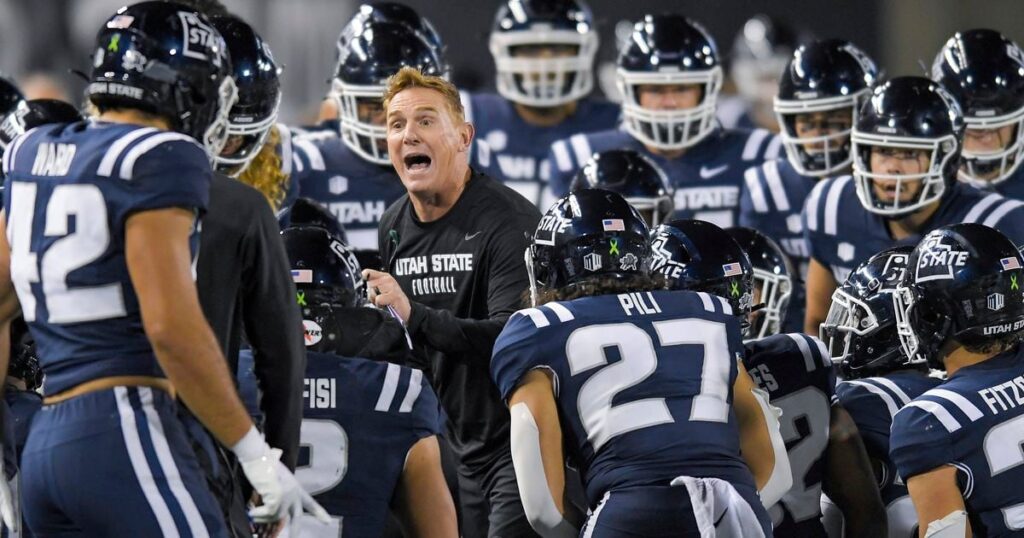When news breaks from football programs and athletic departments, such as that coming from Utah State this week, that their head football coach and assistant athletic director are being fired for reasons related to Title IX policies, it is hard not to think two things: 1) to lament that ignorant attitudes and foolish decisions are still harbored and made by prominent college sports leaders, and 2) to celebrate that when such erroneous attitudes and decisions are held and made, there are consequences from those in power that go beyond traditional rebukes and mild punishments.
What happened to football coach Blake Anderson and assistant AD Jerry Bovey – being fired for violating the aforementioned rules – is a wake-up call to awareness that these issues and things still exist, not just at Utah State, but probably with other sports teams and other athletic departments at schools everywhere.
But for now, let’s focus on USU.
The university's statement included language that had been previously released: “This decision follows a thorough external investigation into alleged violations of university policies implementing Title IX, which requires full and timely reporting of disclosures of sexual misconduct, including domestic violence, and prohibits employees from self-investigating disclosures of sexual misconduct.”
Utah State said Anderson violated its rules regarding incidents that occurred in the spring of 2023. He has 14 days to respond to the university's request for his dismissal. He has already begun responding with his lawyers.
Full disclosure: I am not aware of any specific actions or inactions that Anderson, Bovee, or the football program's director of player development and community affairs, Austin Albrecht, took in this particular case that led the school to harshly discipline them in this way, other than the fact that, as the school put it, there were alleged “violations of university policy on reporting sexual assault and domestic violence” and “failures in professional responsibilities.” I do know that Anderson has had issues in the past for inappropriate responses and comments he made to players about victims of sexual assault.
How many chances will he be given?
Anderson does not appear to give the benefit of the doubt to victims who were so adversely affected by the actions of individuals within his program, and it would be easy to withhold the same benefit from him now that he is fighting back against these findings.
An infamous recording of his remarks from 2021, in which Anderson told players that being a victim of sexual assault has “never been so glamorized” and that his football team is a “target,” urging players to “not create victims.”
Anderson later apologized for those comments and continued to coach at USU.
The details of why University President Elizabeth Cantwell and current Athletic Director Diana Sabaw took the action they did are unclear, but let's be clear here: It was probably justified.
They should be commended for digging into their own program and frankly taking strong steps to root out the tragic nonsense that has been going on for so long at USU, rather than getting defensive and building a wall around it. Not only is the school's reputation at stake, but it goes without saying that harm is being done to individuals who should never have been harmed in the first place.
Logan's track record is not stellar. There have been too many well-publicized crimes there over the years, both before and after Principal Anderson took over. And, since we're speaking in a generalized, blanket sense, there have been similar problems within other athletic departments at other schools.
A USA Today Network investigation a few years ago found that over the previous five years, universities “disciplined NCAA athletes for sexual misconduct at more than three times the rate of the general student body, with football players receiving the most discipline.” The network said the study was likely an underestimate because “many campus rapes and sexual assaults go unreported and many universities refuse to inform the public about such issues.”
Following Anderson's apology comments, one might think that football players are being unfairly targeted. The truth is that there is a real trend happening among college football teams where athletes are committing crimes and need to be dealt with appropriately.
By appropriate, I mean proper vigilance and proper reporting through the proper channels via coaches, assistant athletic directors, director of football programs, etc., and urgent issues must be reported promptly and directly to the appropriate administrator or authority in order for them to be handled appropriately.
What Cantwell and Sabau are doing appears to be correcting that oversight and sending a message that improper reporting of sexual misconduct, including domestic violence, will no longer be tolerated.
That's good.
Again, I don’t know the details of what Anderson, Bovee and Albrecht did or did not do, but if the University’s statement is true, it’s clear that proper reporting was interrupted in some way and those who faced termination were negligent in some way.
Misguided head coaches and administrators may be inclined to intentionally or inadvertently try to protect their players, assistants, staff or themselves from the external repercussions of sexual or domestic misconduct. It may be viewed through a dark lens as selfishness or distorted loyalty. But that mindset must be reframed and changed so that everyone in a leadership position on a football team or any team follows proper procedures.
They are there for a good reason.
Cantwell and Sabau know this.
Attractiveness has nothing to do with it.
I'm tired of the old school, hunker down, hide and cover your ass mentality. It's not particularly complicated. If there is misconduct within the program, report it promptly, immediately and fully. The well-being of more than just the athletes and coaches is at stake.
And as Utah shows, your job is at risk too.

